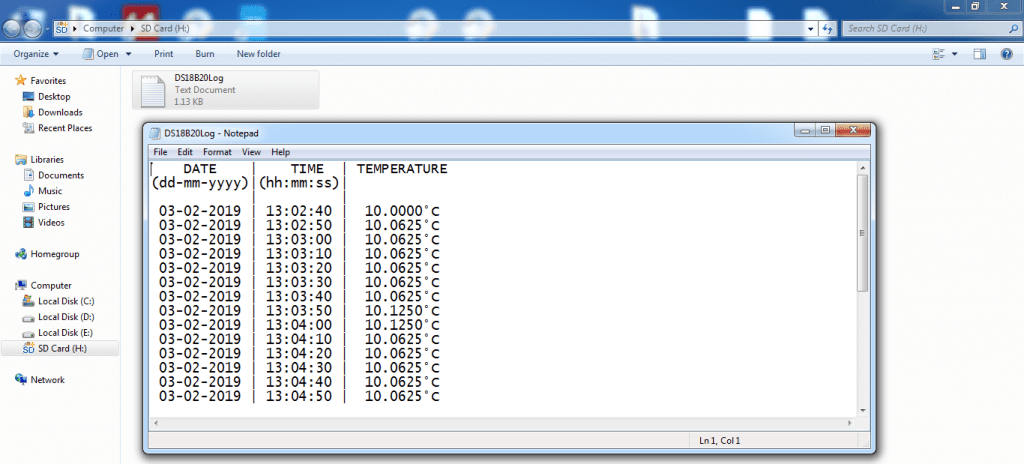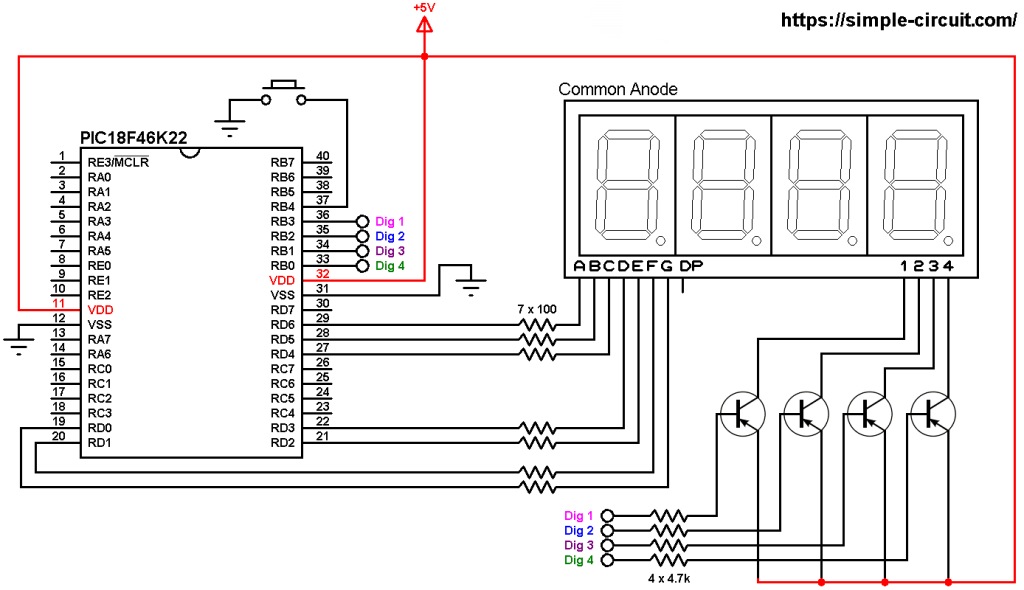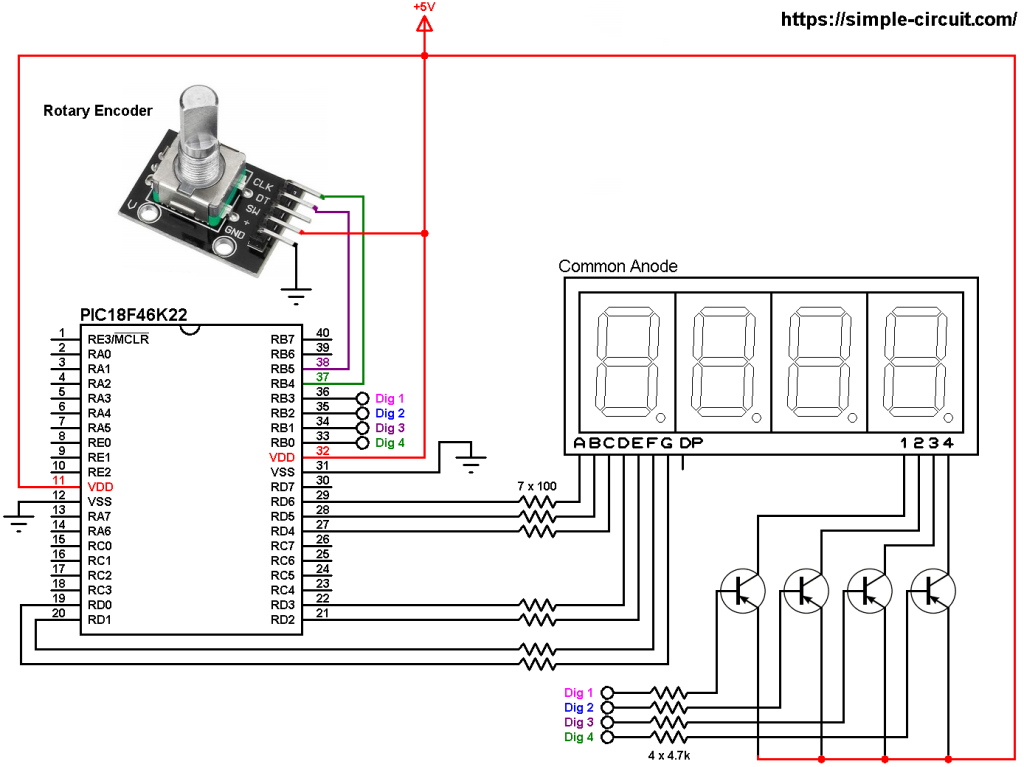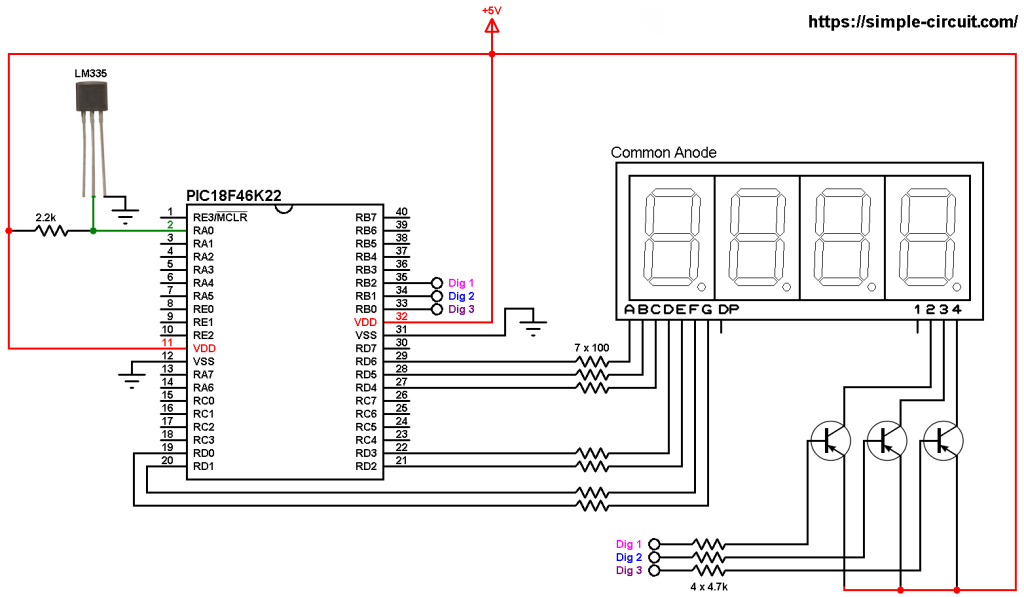This project shows how to build a temperature data logger using PIC18F46K22 microcontroller, SD card and DS18B20 digital temperature sensor.
The PIC18F46K22 MCU reads temperature values from the DS18B20 sensor and saves them to a text file stored in the SD card. DS1307 real time clock chip is used to get time and date information.
Time, date and temperature values are displayed on 20×4 LCD screen.
MikroC PRO for PIC compiler is used in this project.
FAT32 Library for mikroC compiler:
MikroElektronika provides a nice library for FAT32 file system (& SD card). This library can be downloaded from the following link:
FAT32 Library for mikroC compiler
The extension of the downloaded file is .mpkg, and in order to open and install the library we need a small software named: Package Manager, it’s also a free software provided by MikroElektronika, download link is below:
Package Manager download
To see how to interface PIC18F46K22 with SD card, visit the following post:
PIC18F46K22 Interface with SD card – Write & read files | mikroC Projects
Hardware Required:
This is a list of all components required to build this project.
- PIC18F46K22 microcontroller —-> datasheet
- FAT32 formatted SD card (MMC, SD, SDHC, microSD ….)
- micro SD card module
- USB-to-serial UART converter (like: FT232RL module)
- 20×4 LCD screen
- DS18B20 temperature sensor —-> datasheet
- DS1307 RTC —-> datasheet
- 32.768 kHz crystal oscillator
- 2 x 10k ohm resistor
- 4.7k ohm resistor
- 330 ohm resistor
- 2 x push button
- 10k ohm variable resistor or potentiometer
- 3V coin cell battery
- Breadboard
- 5V source
- Jumper wires
Temperature data logger using PIC18F46K22 circuit:
The following image shows project hardware circuit diagram.
As a small hint, it’s highly recommended to add a voltage level translator to MISO line in order to step up the 3.3V that comes from the SD card into 5V which goes to SDI1 pin (#23) of the PIC18F46K22 microcontroller, here we can use the integrated circuit 74HCT125.
In this project I used micro SD card module, this module is supplied from circuit 5V source, it contains the AMS1117-3V3 voltage regulator which is used to supply the SD card with 3.3V. Also this module contains an IC which is 74LVC125A and it is used as level translator (from 5V to 3.3V).
All the grounded terminals are connected together.
The PIC18F46K22 microcontroller does have 2 MSSP modules: MSSP1 and MSSP2 (MSSP: Master Synchronous Serial Port), each one of them may work as hardware SPI module or hardware I2C module. The SD card uses SPI protocol, it’s connected to MSSP1 module (used as SPI) hardware pins (SCK1, SDI1 and SDO1). So the micro SD card module is connected to the circuit as follows (from left to right):
The first pin of the micro SD card module (GND) is connected to circuit ground.
The second pin of the micro SD card module (VCC) is connected to circuit +5V.
The third pin of the micro SD card module (MISO) is connected to pin SDI1 (RC4) of the PIC18F46K22.
The fourth pin of the micro SD card module (MOSI) is connected to pin SDO1 (RC5) of the PIC18F46K22.
The fifth pin of the micro SD card module (SCK) is connected to pin SCK1 (RC3) of the PIC18F46K22.
The last pin of the micro SD card module (CS) is connected to pin RC2 of the PIC18F46K22.
The DS1307 RTC chip uses I2C protocol, its data pins (SCL and SDA) are connected to MSSP2 module which is configured to operate in I2C mode. So, the SCL and SDA pins of the DS1307 RTC are respectively connected to SCL2 (RD0) and SDA2 (RD1) of the PIC18F46K22 microcontroller.
In the circuit there are two push buttons: B1 and B2, they are connected to pins RB0 (#33) and RB1 (#34) respectively, these buttons are used to set time and date of the real time clock.
The DS18B20 temperature sensor has 3 pins (from left to right): GND, data and VCC where:
GND is connected to circuit ground (0V)
Data pin is connected to pin RB5 (#38) of the PIC18F46K22
VCC is connected to +5V.
The 20×4 LCD screen (4 rows and 20 columns) is used to display time, date and temperature where:
RS —> pin RD2
E —> pin RD3
D4 —> pin RD4
D5 —> pin RD5
D6 —> pin RD6
D7 —> pin RD7
VSS, RW, D0, D1, D2, D3 and K are connected to circuit ground
VEE to the variable resistor (or potentiometer) output
VDD to +5V and A to +5V through 330 ohm resistor.
VEE pin is used to control the contrast of the LCD. A (anode) and K (cathode) are the back light LED pins.
The FT232RL board (USB to serial converter) RX pin is connected to PIC18F46K22 TX1 pin (RC6) which is USART1 module transmission pin (the PIC18F46K22 has 2 hardware USART modules).
In this project the PIC18F46K22 microcontroller runs with its internal oscillator @ 16 MHz and MCLR pin is configured as input.
Temperature data logger using PIC18F46K22 C code:
The C code below is for mikroC PRO for PIC compiler, it was tested with version 7.2.0.
To be able to compile project C code with no error, a driver (library) for the DS1307 RTC is required, download link is below. After you download the driver file which named DS1307.c, add it to your project folder.
DS1307 mikroC library
For more details about the DS1307 library, visit the following post:
DS1307 RTC Library for mikroC Compiler | mikroC Projects
The SD card chip select pin (SS) is connected to pin RC2 of the PIC18F46K22, it’s defined in the C code as:
1 2 3 | // SD card chip select pin connection sbit Mmc_Chip_Select at RC2_bit; sbit Mmc_Chip_Select_Direction at TRISC2_bit; |
The connection of the two push buttons are defined in the code as shown below:
1 2 3 | // button definitions #define button1 RB0_bit // button B1 is connected to RB0 pin #define button2 RB1_bit // button B2 is connected to RB1 pin |
The microcontroller reads temperature values from the DS18B20 sensor and saves it (with time and date) to the SD card every 10 seconds, for that I used the following if condition:
1 | if( ((mytime->seconds % 10) == 0) && (mytime->seconds != p_second) ) |
where the variable p_second is used to save only one value every 10 seconds.
Functions used in the code:
FAT32_Init(): this function initializes the FAT32 library as well as the SD card, it returns 0 if OK and non-zero if error.
FAT32_Open(“DS18B20Log.txt”, FILE_APPEND): this function creates (& opens) a new file named “DS18B20Log.txt” if it doesn’t already exists, if the file exists, it opens and moves the cursor to the end of the file, returns 0 if OK and non-zero if error (for example file exists).
FAT32_Write(fileHandle, “…”, 26): writes a text (for example “…” ) of length (for example 26 characters) to the file associated with fileHandler.
FAT32_Close(fileHandle): closes the file associated with fileHandler, returns 0 if OK and non-zero if error.
char debounce (): this function is for button B1 debounce, returns 1 if button is debounced.
void wait(): this function is just a delay of 500 ms except that it can be interrupted by the two push buttons (B1 and B2). In this function Timer0 module is used to count the 500 milliseconds, it is used as 16-bit timer with prescaler = 32 (==> 1 tick every 8 microseconds ==> 62500 x 8 = 500000 us = 500 ms).
char edit(char x_pos, char y_pos, char parameter): this function is for setting the real time clock, returns the edited parameter.
void dow_print(): displays day of the week (Monday, Tuesday …) on the LCD.
void rtc_print(): displays time and date on the LCD. This function calls the previous one for displaying day of the week.
unsigned int ds18b20_read(): this function reads temperature from the DS18B20 sensor, returns the value of the temperature as unsigned 16-bit number.
Rest of code is described through comments.
Full mikroC code:
Configuration words (for PIC18F46K22 MCU):
CONFIG1H = 0x0028
CONFIG2L = 0x0018
CONFIG2H = 0x003C
CONFIG3H = 0x0037
CONFIG4L = 0x0081
CONFIG5L = 0x000F
CONFIG5H = 0x00C0
CONFIG6L = 0x000F
CONFIG6H = 0x00E0
CONFIG7L = 0x000F
CONFIG7H = 0x0040
1 2 3 4 5 6 7 8 9 10 11 12 13 14 15 16 17 18 19 20 21 22 23 24 25 26 27 28 29 30 31 32 33 34 35 36 37 38 39 40 41 42 43 44 45 46 47 48 49 50 51 52 53 54 55 56 57 58 59 60 61 62 63 64 65 66 67 68 69 70 71 72 73 74 75 76 77 78 79 80 81 82 83 84 85 86 87 88 89 90 91 92 93 94 95 96 97 98 99 100 101 102 103 104 105 106 107 108 109 110 111 112 113 114 115 116 117 118 119 120 121 122 123 124 125 126 127 128 129 130 131 132 133 134 135 136 137 138 139 140 141 142 143 144 145 146 147 148 149 150 151 152 153 154 155 156 157 158 159 160 161 162 163 164 165 166 167 168 169 170 171 172 173 174 175 176 177 178 179 180 181 182 183 184 185 186 187 188 189 190 191 192 193 194 195 196 197 198 199 200 201 202 203 204 205 206 207 208 209 210 211 212 213 214 215 216 217 218 219 220 221 222 223 224 225 226 227 228 229 230 231 232 233 234 235 236 237 238 239 240 241 242 243 244 245 246 247 248 249 250 251 252 253 254 255 256 257 258 259 260 261 262 263 264 265 266 267 268 269 270 271 272 273 274 275 276 277 278 279 280 281 282 283 284 285 286 287 288 289 290 291 292 293 294 295 296 297 298 299 300 301 302 303 304 305 306 307 308 | /************************************************************************************** Temperature logger using PIC18F46K22 microcontroller, DS1307 RTC and DS18B20 sensor. Time, date and temperature are displayed on 20x4 LCD. C Code for mikroC PRO for PIC compiler. Internal oscillator used @ 16MHz Configuration words: CONFIG1H = 0x0028 CONFIG2L = 0x0018 CONFIG2H = 0x003C CONFIG3H = 0x0037 CONFIG4L = 0x0081 CONFIG5L = 0x000F CONFIG5H = 0x00C0 CONFIG6L = 0x000F CONFIG6H = 0x00E0 CONFIG7L = 0x000F CONFIG7H = 0x0040 This is a free software with NO WARRANTY. http://simple-circuit.com/ ***************************************************************************************/ // SD card chip select pin connection sbit Mmc_Chip_Select at RC2_bit; sbit Mmc_Chip_Select_Direction at TRISC2_bit; // LCD module connections sbit LCD_RS at RD2_bit; sbit LCD_EN at RD3_bit; sbit LCD_D4 at RD4_bit; sbit LCD_D5 at RD5_bit; sbit LCD_D6 at RD6_bit; sbit LCD_D7 at RD7_bit; sbit LCD_RS_Direction at TRISD2_bit; sbit LCD_EN_Direction at TRISD3_bit; sbit LCD_D4_Direction at TRISD4_bit; sbit LCD_D5_Direction at TRISD5_bit; sbit LCD_D6_Direction at TRISD6_bit; sbit LCD_D7_Direction at TRISD7_bit; // end LCD module connections // button definitions #define button1 RB0_bit // button B1 is connected to RB0 pin #define button2 RB1_bit // button B2 is connected to RB1 pin #define DS1307_I2C2 // use hardware I2C2 moodule (MSSP2) for DS1307 RTC #include <DS1307.c> // include DS1307 RTC driver source file RTC_Time *mytime; // DS1307 library variable // include __Lib_FAT32.h file (useful definitions) #include "__Lib_FAT32.h" __HANDLE fileHandle; // only one file can be opened // other variable short fat_err; short i, p_second = 1; // a small function for button1 (B1) debounce char debounce() { char m, count = 0; for(m = 0; m < 5; m++) { if ( !button1 ) count++; delay_ms(10); } if(count > 2) return 1; else return 0; } // interrupted delay void wait() { unsigned int TMR0_value = 0; TMR0L = TMR0H = 0; // rest Timer0 low and high registers while( (TMR0_value < 62500L) && button1 && button2 ) TMR0_value = (TMR0H << 8) | TMR0L; } char edit(char x_pos, char y_pos, char parameter) { char buffer[3]; while(debounce()); // call debounce function (wait for B1 to be released) sprinti(buffer, "%02u", (int)parameter); while(1) { while( !button2 ) { parameter++; if(i == 0 && parameter > 23) // if hours > 23 ==> hours = 0 parameter = 0; if(i == 1 && parameter > 59) // if minutes > 59 ==> minutes = 0 parameter = 0; if(i == 2 && parameter > 31) // if day > 31 ==> day = 1 parameter = 1; if(i == 3 && parameter > 12) // if month > 12 ==> month = 1 parameter = 1; if(i == 4 && parameter > 99) // if year > 99 ==> year = 0 parameter = 0; sprinti(buffer, "%02u", (int)parameter); LCD_Out(y_pos, x_pos, buffer); delay_ms(200); } LCD_Out(y_pos, x_pos, " "); wait(); LCD_Out(y_pos, x_pos, buffer); wait(); if(!button1) // if button B1 is pressed { i++; // increment 'i' for the next parameter return parameter; // return parameter value and exit } } } void dow_print() { switch(mytime->dow) { case SUNDAY : LCD_Out(1, 5, " SUNDAY "); break; case MONDAY : LCD_Out(1, 5, " MONDAY "); break; case TUESDAY : LCD_Out(1, 5, " TUESDAY "); break; case WEDNESDAY: LCD_Out(1, 5, "WEDNESDAY"); break; case THURSDAY : LCD_Out(1, 5, "THURSDAY "); break; case FRIDAY : LCD_Out(1, 5, " FRIDAY "); break; default : LCD_Out(1, 5, "SATURDAY "); } } void rtc_print() { char buffer[17]; // print day of the week dow_print(); // print time sprinti(buffer, "TIME: %02u:%02u:%02u", (int)mytime->hours, (int)mytime->minutes, (int)mytime->seconds); LCD_Out(2, 1, buffer); // print date sprinti(buffer, "DATE: %02u-%02u-20%02u", (int)mytime->day, (int)mytime->month, (int)mytime->year); LCD_Out(3, 1, buffer); } unsigned int ds18b20_read() { unsigned int _temp; Ow_Reset(&PORTB, 5); // onewire reset signal Ow_Write(&PORTB, 5, 0xCC); // issue command SKIP_ROM Ow_Write(&PORTB, 5, 0x44); // issue command CONVERT_T while (Ow_Read(&PORTB, 5) == 0) ; Ow_Reset(&PORTB, 5); // onewire reset signal Ow_Write(&PORTB, 5, 0xCC); // issue command SKIP_ROM Ow_Write(&PORTB, 5, 0xBE); // issue command READ_SCRATCHPAD _temp = Ow_Read(&PORTB, 5); // read temperature LSB byte _temp |= (Ow_Read(&PORTB, 5) << 8); // read temperature MSB byte return _temp; } // main function void main() { OSCCON = 0x70; // set internal oscillator to 16MHz ANSELB = 0; // configure all PORTB pins as digital ANSELC = 0; // configure all PORTC pins as digital ANSELD = 0; // configure all PORTD pins as digital T0CON = 0x04; // configure Timer0 module (16-bit timer & prescaler = 32) // enable RB0 and RB1 internal pull ups RBPU_bit = 0; // clear RBPU bit (INTCON2.7) WPUB = 0x03; // WPUB register = 0b00000011 delay_ms(1000); // wait a second Lcd_Init(); // initialize LCD module Lcd_Cmd(_LCD_CURSOR_OFF); // cursor off Lcd_Cmd(_LCD_CLEAR); // clear LCD LCD_Out(4, 1, "TEMP:"); // initialize I2C2 module with clock frequency of 100KHz I2C2_Init(100000); // intialize SPI1 module at lowest speed SPI1_Init_Advanced(_SPI_MASTER_OSC_DIV64, _SPI_DATA_SAMPLE_MIDDLE, _SPI_CLK_IDLE_LOW, _SPI_LOW_2_HIGH); UART1_Init(9600); // initialize UART1 module at 9600 baud UART1_Write_Text("\r\n\nInitialize FAT library ... "); fat_err = FAT32_Init(); if(fat_err != 0) { // if there was a problem while initializing the FAT32 library UART1_Write_Text("Error initializing FAT library!"); } else { // the FAT32 library (& SD card) was (were) initialized // re-initialize SPI1 module at highest speed SPI1_Init_Advanced(_SPI_MASTER_OSC_DIV4, _SPI_DATA_SAMPLE_MIDDLE, _SPI_CLK_IDLE_LOW, _SPI_LOW_2_HIGH); UART1_Write_Text("FAT Library initialized"); // create (or open if already exists) a text file 'DS18B20Log.txt' UART1_Write_Text("\r\n\r\nCreate 'DS18B20Log.txt' file ... "); fileHandle = FAT32_Open("DS18B20Log.txt", FILE_APPEND); if(fileHandle == 0){ UART1_Write_Text("OK"); // write some texts to 'DS18B20Log.txt' file FAT32_Write(fileHandle, " DATE | TIME | TEMPERATURE\r\n", 38); FAT32_Write(fileHandle, "(dd-mm-yyyy)|(hh:mm:ss)|\r\n", 26); FAT32_Write(fileHandle, " | |\r\n", 26); } else UART1_Write_Text("error creating file or file already exists"); // now close the file 'DS18B20Log.txt' FAT32_Close(fileHandle); } // enable RTC oscillator OSC_Enable(); while(1) { // read current time and date from the RTC chip mytime = RTC_Get(); // print all data rtc_print(); if( !button1 ) // if button B1 is pressed if( debounce() ) // call debounce function (make sure if B1 is pressed) { i = 0; while( debounce() ); // call debounce function (wait for button B1 to be released) TMR0ON_bit = 1; // enable Timer0 module while(1) { while( !button2 ) // if button B2 button is pressed { mytime->dow++; if(mytime->dow > SATURDAY) mytime->dow = SUNDAY; dow_print(); // print week day delay_ms(500); // wait half a second } LCD_Out(1, 5, " "); wait(); // call wait() function dow_print(); // print week day wait(); // call wait() function if( !button1 ) // if button B1 is pressed break; } mytime->hours = edit(7, 2, mytime->hours); // edit hours mytime->minutes = edit(10, 2, mytime->minutes); // edit minutes mytime->day = edit(7, 3, mytime->day); // edit day (day of month) mytime->month = edit(10, 3, mytime->month); // edit month mytime->year = edit(15, 3, mytime->year); // edit year mytime->seconds = 0; // reset seconds TMR0ON_bit = 0; // disable Timer0 module while(debounce()); // call debounce function (wait for button B1 to be released) // write data to the RTC chip RTC_Set(mytime); } // end 'if( debounce() )' if( ((mytime->seconds % 10) == 0) && (mytime->seconds != p_second) ) { // read & print temperature value from sensor every 10 seconds char buffer[11]; unsigned int ds18b20_temp; p_second = mytime->seconds; // save current second ds18b20_temp = ds18b20_read(); // read temperature from DS18B20 sensor if (ds18b20_temp & 0x8000){ // if temperature is negative ds18b20_temp = ~ds18b20_temp + 1; // change temperature value to positive form sprinti(buffer, "-%02u.%04u%cC", (ds18b20_temp/16) % 100, (ds18b20_temp & 0x0F) * 625, (int)223); } else sprinti(buffer, " %02u.%04u%cC", (ds18b20_temp/16) % 100, (ds18b20_temp & 0x0F) * 625, (int)223); LCD_Out(4, 6, buffer); if(fat_err == 0) { // if the FAT32 library was successfully initialized char buffer2[26]; // open DS18B20Log.txt file with append permission FAT32_Open("DS18B20Log.txt", FILE_APPEND); sprinti(buffer2, " %02u-%02u-20%02u | %02u:%02u:%02u | ", (int)mytime->day, (int)mytime->month, (int)mytime->year, (int)mytime->hours, (int)mytime->minutes, (int)mytime->seconds); FAT32_Write(fileHandle, buffer2, 25); buffer[8] = '°'; // put degree symbol FAT32_Write(fileHandle, buffer, 10); FAT32_Write(fileHandle, "\r\n", 2); // start a new line // now close the file (DS18B20Log.txt) FAT32_Close(fileHandle); } // end 'if(fat_err == 0)' } // end 'if( (mytime->seconds % 10) == 0)' delay_ms(100); // wait 100 milliseconds } // end 'while(1)' } // end main function // end of code. |
This project was tested in real hardware circuit using original Samsung microSD card with capacity of 32GB. The following image shows data logger file (DS18B20Log.txt) created by the hardware circuit:
Proteus simulation:
This project could be simulated using Proteus software, the following video shows the result of the simulation.
Note that Proteus simulation circuit is not the same as real hardware circuit, project hardware circuit is shown above.
Proteus simulation file download link:
PIC18F46k22 SD card DS1307 DS18B20 datalogger
SD Card image file (FAT32_MBR.ima) download link:
SD Card FAT32 image
Discover more from Simple Circuit
Subscribe to get the latest posts sent to your email.





